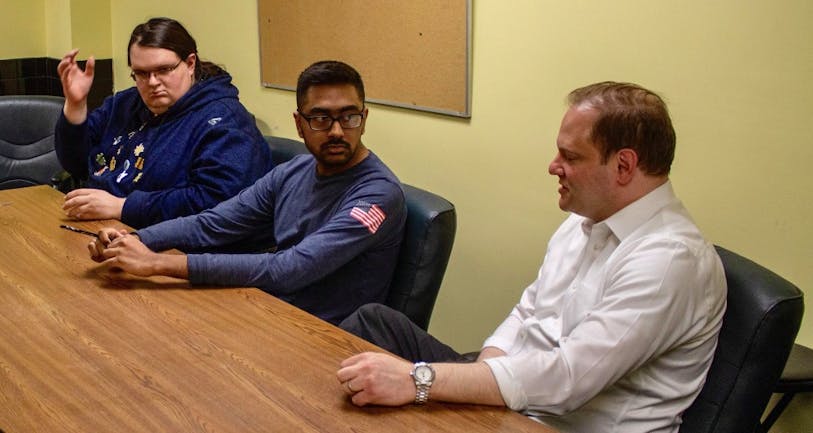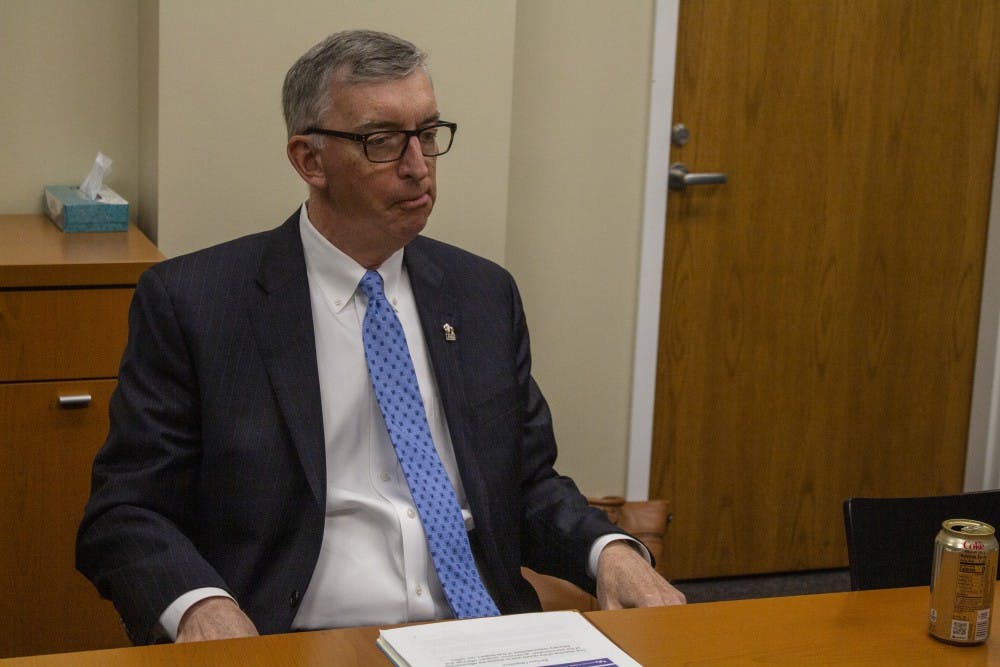UB is replacing Sub-Board I, which has overseen student government funds for the past 49 years, with the Faculty Student Association, a private nonprofit.
FSA, which currently conducts business as Campus Dining & Shops, will take over SBI’s $3.2 million in investment accounts on July 1, according to Vice President of Student Life A. Scott Weber and Vice President for Finance and Administration Laura Hubbard.
The change comes as a surprise to SBI’s 17 full-time employees, who learned on Monday their office was being dissolved and at least nine workers would lose their jobs. UB is also considering cutting student services supplied by SBI, including free legal counsel, the South Campus safety shuttle bus, radio station WRUB and an off-campus housing search service.
Student government leaders, too, learned of the decision Monday and feel blindsided by the announcement and angry they were shut out of the decision-making process. On Monday, Tuesday and Wednesday, The Spectrum office was flooded with concerns.
Weber defended the decision, which came a year after a university-wide audit into SBI’s practices and seven months into an internal campus review of SBI’s practices. The audit began after former Vice President for Student Life Dennis Black pleaded guilty to embezzling $320,000 from FSA. He was convicted of grand larceny in 2017.
Student leaders expressed shock that UB would consolidate power into FSA, the agency Black used to siphon money into a private slush fund.
It’s also an agency students have historically mistrusted. Students established SBI in 1970 to take control of student funds away from FSA, according to Joshua Lippes, SBI’s legal counsel, whose father started SBI’s free legal service in 1976.
Student leaders feel the university has not been transparent during the internal review of SBI practices. Administrators, they said, framed the review as a first step in creating a contract between SBI and UB.
“They met with [SBI] and we went over the budget for that department and talked about what the department did,” Jacob Brown, SBI vice president, said. “Each one of those meetings began with the same sentence — ‘We’re here to assess the department with the hopes to get a contract at the end of this process.’”
In a statement to The Spectrum, Weber and Hubbard said student governments wouldn’t be complying with SUNY guidelines if they remained with SBI, which has never been “contractually-recognized" by UB.
Lippes said SBI has asked UB for a contract multiple times over the last 20 years.
“We approached the university asking, ‘Would you like to have a contract at some point?’ We even proposed a contract and they said they’ll run it up the flagpole,” Lippes said. “And that was it. It died on the vine.”
Weber and Hubbard said the review “did not focus on past practices” and had the “goal of making decisions for the future.” Weber and Hubbard said SBI has never asked to meet with either of them regarding a contract.
“Lack of transparency”
Members of SBI criticized the committee for its lack of representative voices and unwillingness to share its findings and goals during the process. The administrative review committee consisted of Carrie Woodrow (director of Policy, Compliance and Internal Controls), Sarah Augustynek (compliance officer for the UB School of Dental Medicine), Phyllis Floro (director of Student Engagement), Beth A. Corry (associate vice president and controller of business services), Christina Hernandez (associate vice president of Student Life) and Susan Snyder (director of Health Services).
Three of the six people on the committee –– Augustynek, Corry and Hernandez –– are on FSA’s board of directors.
Hubbard, who led the committee, is an administrative director of FSA.
SA President Gunnar Haberl and Treasurer Tanahiry Escamilla said the committee’s close ties with FSA presented a “potential conflict of interest in the university’s review and conclusions.”
In a statement to The Spectrum, Haberl and Escamilla wrote while they were willing to “work diligently” with Weber and Hubbard, the lack of student input in the decision was “unacceptable.”
Weber said he was aware that some felt the makeup of the committee was “inappropriate” given the final recommendations, but said there was “no expectation that FSA would serve as the fiscal agent of choice” at the beginning of the review.
Brown, who is a student director on the FSA board, said despite Weber’s response, he still believes the review committee posed a conflict of interest.
“I’ll give him the benefit of the doubt, but it’s kind of hard to sit here and hear them say ‘Well we're going with FSA’ when three members of the committee and one of the individuals that formed the committee, hold positions on the [FSA] board,” Brown said. “Perception goes a long way.”
Weber said during a Monday meeting with The Spectrum that FSA wouldn’t be continuing programs, such as the South Campus shuttle service, dry cleaning and free legal services, as students don’t know about or use them.
Weber and Hubbard said they got student input by having “candid conversations” with leaders from each student government and asking questions about SBI’s services.
“What we found from our review is that many students weren’t aware of those services, they didn’t necessarily want those services or feel like they were needed,” Weber said. Weber and Hubbard did not provide The Spectrum, student governments or SBI with any documented proof of student opinions.
The safety shuttles took on an average of 60 rides per night and roughly 13,000 riders during the 2017-18 school year, according to a 2018 SBI Utilization Report.
The SBI housing website, which helps students find affordable housing near campus, has an average 47,000 hits per year.
Sarah Scalise, a senior speech and hearing major, said the housing website is a “really helpful tool” for students unfamiliar with the Buffalo area.
“It’s hard to find sites that you trust when searching for housing, and taking it away would make it more difficult for students who specifically need housing off of South Campus. It’s a way for UB students to connect with landlords via a safe medium,” Scalise said. “I’m currently using the site to search for houses and I’m disappointed to hear that I can no longer do so.”
In the 2017-18 year, 1,133 students used SBI’s free legal services, of which 23% sought advice for housing-related issues, 17% for vehicle and traffic related issues and 10% for immigration issues.
Vigan Osmani, a senior sociology major and an international student from Albania, said International Student Services directed him to SBI’s immigration lawyer Kelly Carr when he needed help on his Optional Practical Training application.
“I think it’s one of the worst decisions to stop the free legal advice from the SBI office because it is our only source of help in terms of immigration,” Osmani said.
Weber and Hubbard said SBI’s free legal services are a liability for the university since SBI is housed in the Student Union. They also said it wasn’t the university’s responsibility to provide legal advice to students.
“Legal support, on immigration matters, will be provided to international students through the International Student Services Office,” their joint statement said. “The university is not responsible to provide legal service to students for personal matters.”
“ISSS cannot give legal advice. They’re not lawyers,” Lippes said. “Kelly Carr, who is our immigration attorney, is very skilled and knowledgeable in this field and helps [international students].”
Other SBI services are less frequently used. Its League of Legends tournament, hosted annually during UBCON, sold 41 tickets last year and had 86 participants. Students have used the dry-cleaning services 39 times since January 2018 and cost SBI nothing, according to SBI President Jennifer Schechter.
Weber and Hubbard said it would be “inappropriate” for FSA to provide these services to students, but would work with student governments if they wished to provide these services.
SBI members criticized the review for presenting misleading information.

(left to right) Connor Walters, Arsh Issany and Joshua Lippes discuss UB’s decision to dissolve Sub-Board I. The Faculty Student Association will take over SBI’s investment accounts on July 1.
In the presentation given to SBI, student governments and The Spectrum, a “Fiscal Agent-Cost Analysis” chart states that the student governments pay an average of 18% of student activity fees to SBI to perform fiscal services.
While this is not incorrect, it does not take into account the governments’ total revenue and doesn’t include roughly $1.5 million of funds, according to Michael Grela, SBI director of accounting and operations.
Grela calculated the average percentage student governments pay SBI –– based off their total revenues –– to be 8.18%.
Connor Walters, vice president of the Graduate Student Association, said the review is also incorrect in saying SBI is not a contractually recognized organization.
SUNY states that student governments must use a fiscal agent which is an “Auxiliary Services Corporation/Faculty Student Association, campus-based foundation, Research Foundation or other contractually-recognized campus-affiliated organization.”
“The GSA does have a contract with SBI and it is therefore the opinion of the GSA that SBI meets the SUNY guidelines’ definition of a ‘contractually-recognized campus-affiliated organization,’ making them a valid fiscal agent,” Walters said.
“Extremely unrealistic and extremely dangerous”
Weber and Hubbard met with various student governments and informed them of their decision Monday before meeting with members of SBI’s executive board itself.
Lisa Bolt, Weber’s administrative assistant, emailed student government and SBI members on behalf of Weber, Hubbard and SUNY Counsel Bob Ruggeri on May 1. In the email, Bolt said they scheduled a meeting to discuss the review results on May 6 at 11 a.m. and asked everyone to confirm their availability.
Schechter responded saying no SBI board members could attend at that time due to classes and finals, to which Bolt said, “Because there are many players in the notification process, we will hold the 11 a.m. meeting with Sub-Board as planned.”
“I don’t like the implication that I need to neglect my student duties to take care of this,” Schechter said. “It showed a lack of respect to us, both as students and as leaders in our respective organizations.”
Members of both SBI and the student governments described tense meetings filled with unanswered questions met with silence, leaving student leadership unsatisfied and confused.
“At one point, they just stopped answering questions. So we would just talk, we would say something, and then they’d be completely silent,” Jessica Coley, president of GSA, said.
Following the Monday announcement and meetings, Weber was out of office on Tuesday and booked with meetings all day Wednesday.
The Spectrum has not heard back from Hubbard directly since Monday’s meeting.
Bill Hooley, executive director of SBI, said the committee finished the review in early March, but needed time to “write it up.”
When Hooley asked Weber and Hubbard when the results would be ready, they said “before the end of the semester.”
Lippes believes the timing of the announcement was intentional.
“I think that the timing of all of this is strategic and troubling,” Lippes said. “All of the student governments are turning over and all of the students are going to be leaving.”
Weber addressed the concern with the announcement timing and said he hopes those involved will “make time” over the summer to help with this transition.
“There is no good time to make a decision like this,” Weber said. “People will always think there’s a better time to make this decision, but the reality is there’s never a good time.”
Arsh Issany*, SBI treasurer and vice president-elect, said he feels “let down” by the decision. Issany said the university’s expectations for the transition are unattainable in such a short amount of time.
“I didn’t think they’d dissolve an entire multimillion dollar corporation, and they’re planning on dissolving it in about two months,” Issany said. “This actually is extremely unrealistic and extremely dangerous.”
“An arbitrary and capricious decision”
For decades, SBI has been trying to gain control of a $1.5 million dollar FSA-owned asset. The asset is the result of a land purchase FSA made in 1964 using a portion of student activity fees. The land was sold in 1987, but FSA has maintained control over the principle investment, despite SBI’s role as fiscal agent for student funds.
Most recently, former SBI Treasurer Kyle Murphy made the case that the $1.5 million asset should be transferred to SBI at an FSA meeting last May.
Weber and Hubbard said FSA intends to “honor the intent and spirit of the 2008 agreement, wherein earnings of the programming fund are allocated to ‘enhance the quality of the university experience for all SUNY/Buffalo students.’”
SBI currently gives these funds back to students in the form of grants. Grela said SBI granted student organizations $60,000-65,000 this year utilizing the funds.
A primary concern shared among those affected by the change is FSA’s recent embezzlement case. Black and Andrea Costantino, former director of Campus Living, stole a combined $334,000 from FSA.
“I find it disconcerting that an organization that had an embezzlement scandal two years ago, is being rewarded with $6-12 million of student assets to handle,” Lippes said.
The case is not lost to Coley, who has been at UB since 2015.
“We all know about the Dennis Black situation,” Coley said. “You're literally saying, ‘Hey, trust us with your money. And come over to FSA, even though we just had this big scandal two or three years ago. Like, why would we trust them with our money when they had this big scandal happen?”
Coley and Walters believe FSA’s changes will further marginalize students who are already financially struggling by taking away services, such as free legal advice.
“I'm already somewhat a part of the living stipend movement,” Coley said. “We're already poor, we can't afford to consult a lawyer.”
Weber compared the change in fiscal agents to the implementation of UB’s HUB Student Center and attributed students’ concerns to “fear of the unknown.”
“When we did HUB implementation you’d think we were taking people’s babies away from them because it was so different,” Weber said. “And now you think of HUB as just being HUB. … Any time you make change it’s very challenging and it’s very hard and people have a vested interest and appropriate concern. … It’s fear of the unknown.”
The review committee recommended SBI shuts down its free safety shuttles and that UB partners with Uber or Lyft in order to provide discounted rides to students in unsafe locations. Weber and Hubbard said the decision is up to student governments and FSA would provide them with a cost-benefit analysis of whatever decision they decided to make.
Schechter said she was OK with paying $85 to GSA because of the free SBI services it afforded her. Now, she said, she has to pay the same amount of fees while not having access to free legal advice or safe transportation off South Campus.
“Right now, I pay $9.33 a semester to get free legal advice, free safety. And now you’re saying that I will still pay that $85 to my government, but now I have to pay $17 to Uber so I can make it home. Now I have to pay $150 to sit down and talk to a lawyer for an hour because I have a question about some Student Conduct thing,” Schechter said. “So you are only burdening our students with more expenses, rather than making it easier on them.”
Brenton J. Blanchet contributed reporting to this story.
*Arsh Issany is a former Spectrum staff writer.
Tanveen Vohra and Jacklyn Walters are co-senior news editors and can be reached at news@ubspectrum.com

Jacklyn Walters is a senior communication major and The Spectrum's managing editor. She enjoys bringing up politics at the dinner table and seeing dogs on campus.
Tanveen Vohra is a former senior news editor and covered international relations and graduate student protests.






